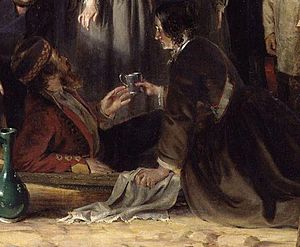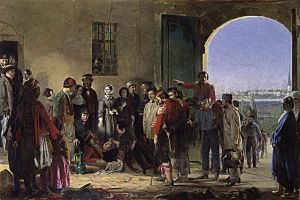Eliza Roberts (nurse) facts for kids
Eliza Roberts (born 1802, died 1878) was a brave English nurse. She was one of the very first nurses to go with Florence Nightingale to Scutari Hospital during the Crimean War. Florence Nightingale thought Eliza was the best of all her nurses and made her the Head Nurse.
Contents
Early Life and Nursing Career
Eliza Roberts was born in 1802 in Shadwell, East London. Her family was working-class. She started her nursing career in 1829 at St Thomas' Hospital in London. She worked as an assistant nurse in the men's surgery department.
By 1840, she became a "sister" (a senior nurse) on a men's surgical ward. Doctors at St Thomas' Hospital believed Eliza had more practical knowledge about hospitals and patient care than anyone else. One doctor, John Flint South, said she knew more about surgical cases than even military hospital staff in the Crimea. Another senior medical officer, Robert Whitfield, called her the best nurse he had ever met, "one in a century."
Even though she was an amazing nurse, she sometimes had trouble managing other assistant nurses. In 1853, after 24 years of service, Eliza retired from St Thomas' Hospital at age 51 because she wasn't feeling well.
Helping in the Crimean War
Eliza's health improved, and when the Crimean War started the next year, she volunteered to help. She joined Florence Nightingale's team of 38 nurses. They traveled to Scutari Hospital to care for sick and wounded soldiers. Robert Whitfield, her former colleague, recommended her as "a thorough surgeon & a superior woman."
Eliza arrived at Scutari with Nightingale on October 23, 1854. Nightingale quickly saw how skilled and capable Eliza was. After just ten days, Nightingale said Eliza was "worth her weight in gold" and made her Head Nurse.
A Valued Nurse
Nightingale believed Eliza's many years of experience made her so good. She wrote that Eliza was much better than other hospital nurses. She praised Eliza's loyalty, dedication to her work, and constant care for her patients. Nightingale said Eliza could do the work of "ten nurses."
Eliza also nursed Nightingale herself when Nightingale became very ill in 1855. One time, she even stopped Lord Raglan, the commander of the British troops, from entering Nightingale's room until Nightingale said it was okay.
Her Special Skills
Eliza had skills that most other nurses in the 1850s didn't have. She was very good at dressing wounds and setting broken bones. Nightingale was very impressed. Senior doctors agreed that Eliza was better at these tasks than many assistant surgeons. A Dutch doctor who served in the Crimea called Eliza Nightingale's "clever aide-de-camp" (a helpful assistant).
Nightingale later said she thought Eliza would have made a great surgeon or doctor. Because of her amazing skills, Nightingale paid Eliza more than her other nurses.
A Strong Personality
Even though Eliza was incredibly important at Scutari, her working-class background sometimes caused problems. Her manners were a bit rough, and she talked a lot. She was also known for having a quick temper and arguing with other nurses. She even called herself "Pepper."
However, Nightingale valued Eliza's nursing skills and experience more than her social manners. Nightingale once wrote that if Eliza left Scutari, she would have to leave too. Eliza knew how much Nightingale depended on her. If Nightingale ever criticized her, Eliza would threaten to quit and go back to England. But Nightingale was willing to overlook Eliza's personality quirks because her nursing skills were so vital.
The army surgeons in the Crimea were also very impressed by her nursing. Thirty-six years later, Nightingale still remembered Eliza as a "splendid nurse and excellent woman." Eliza returned to England with Nightingale on August 8, 1856.
Eliza Roberts' Legacy
In the 1857 painting The Mission of Mercy: Florence Nightingale receiving the Wounded at Scutari by Jerry Barrett, Eliza Roberts is shown kneeling and helping a wounded soldier. She is the only person in the painting doing actual nursing work.
Eliza Roberts passed away in 1878 and was buried in West Norwood Cemetery.
 | Frances Mary Albrier |
 | Whitney Young |
 | Muhammad Ali |



